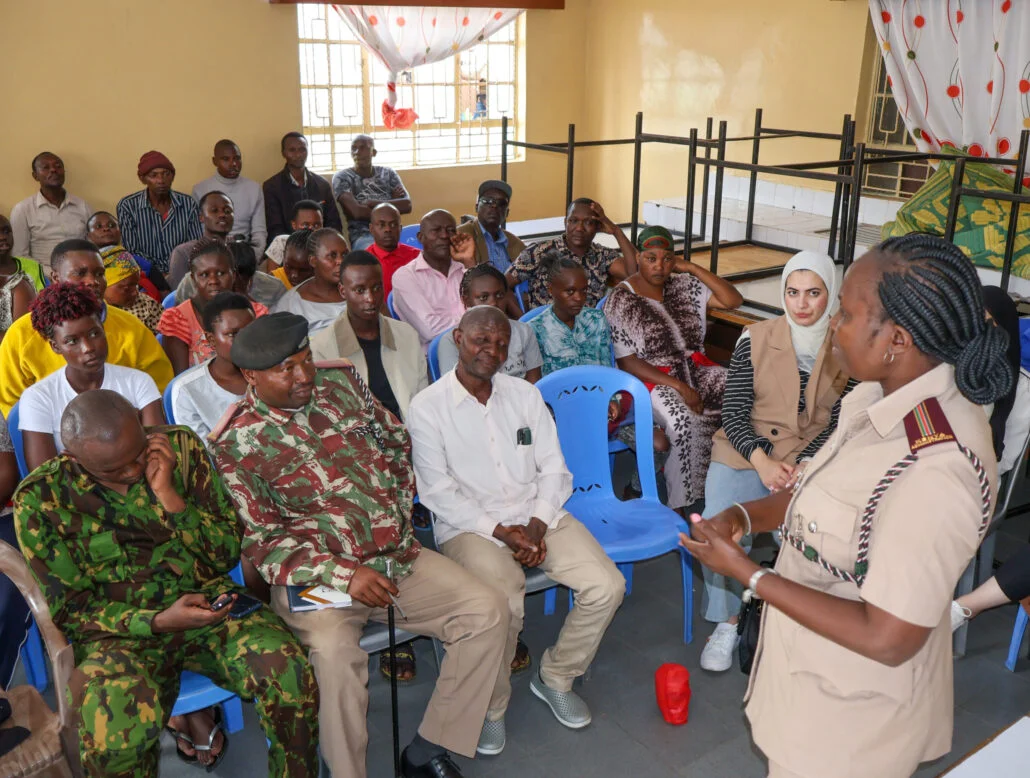
In the heart of the informal settlements,survival is a daily battle.
Here, daylight robbery isn’t just a fear—it’s the norm. Locked doors offer little peace.
Neighbors and former residents whisper warnings instead of greetings.
Eyes stay sharp, always scanning the pathways.
But amidst the chaos, there’s resilience—a community holding on to hope for safer, brighter days.
Welcome to Mathare.
A warm and reassuring presence greets every visitor as Inspector Francisca Halakhe takes pride in her area of duty.
Her friendly smile, attentive demeanor, and genuine concern for the Community create an atmosphere of trust and safety.
Through her actions and the heartfelt connections, she builds with everyone she meets, she exemplifies what it means to serve and
protect.
She gives the team a brief history of Mathare Police Station and explains how she created a cordial relationship with the Community.
The team is drawn from MIDRIFT HURINET, NAYA Community Centre in Jordan, the African Centre for Treatment and Rehabilitation of Torture Victims in Uganda, and DIGNITY—Danish Institute Against Torture country leads in Jordan and Uganda, who were in the Country to share knowledge and experience.
Officer Halakhe further explains to the team how Place-Based Leadership Development (PBLD) was instrumental in her transformative journey with the Community, the Officers, and the National Government Administrative Offices.
“I would like to thank MIDRIFT HURINET for this development. I was in my comfort zone, believing I did not have to go the extra mile in my engagement with the Community.
I do my job and go home.
But there was a challenge in my community. Sexual Gender Based Violence.
My team and I picked this topic as an issue we would address as developed leaders during our development.
We planned to visit Mathare with our group in late September so that they could get first-hand information on the situation.
I planned a baraza with Senior Chief Rose Ayela, the village elders, Nyumba Kumi committee members, and other stakeholders.
We held the Baraza, and one of the issues that came out as prevalent was Sexual and Gender-Based Violence.
The situation was so bad that the vice was normalized, and Community members would prevail on the victim’s relatives not to press charges and finish the issues with some local arrangements.
During the engagement, we asked how they needed help to sort out the issue.
The first issue they requested is for a gender desk. Mathare Police Station did not have one.
They felt they did not feel safe reporting such cases to just any Police Officer, who would add more misery to an already troubled survivor.
They also requested a rescue center for the survivors. Still, we said, “Let’s sort the Gender Desk issue first.”
We followed up with the awareness component on the reporting structures and the dos and don’ts in addressing Sexual and Gender-Based Violence.
After the Baraza, we sat down as a team and wrote proposals to different stakeholders in Nairobi to assist in setting up the Gender desk.
FIDA responded positively, and they have already brought the furniture to the Station. Other stakeholders have also responded positively, and we are in the process of concluding the matter.
From our last Baraza, we had about 20 people, but after that meeting, the interest grew, and now we have incorporated more community members from Mlango Kubwa into the Hospital Ward. Three chiefs from different locations will join us in the meeting.” She concluded.
The team sat in attentive silence, their eyes fixed on Officer Halakhe as they absorbed every word. Their faces reflected a mix of empathy, concern, and determination, showing their deep engagement with the powerful message of addressing sexual and gender-based violence in Mathare. Each nod, furrowed brow, and thoughtful gaze revealed a collective commitment to understanding and driving change.
The determined team made their way to the meeting, navigating the dusty, uneven road with careful steps. The ground alternated between thick mud and jagged bumps, making the journey a test of patience.
On either side, hawkers lined the path, their vibrant, makeshift stalls spilling into the narrow road, creating a lively but chaotic maze of goods, chatter, and movement.
Despite the challenges, their focus remained unwavering, driven by the purpose of the gathering ahead.
The area senior Chief had already mobilized the Baraza.
After the welcoming remarks, she invited Officer Halakhe, who shared the progress made since the last Baraza and how the Community members’ needs have been addressed.
She highlighted how an area called Kampala Ndogo was recording high cases of defilement, teen pregnancies, and Gender-Based Violence and had chosen the place based on the proposal by the Chief also to sensitize the residents on the dangers of perpetuating the same and have an
awareness forum on the reporting structures on SGBV.
The area Chief also requested members of the Ugandan Community living in Mathare not to tolerate perpetrators of GBV from their Community. They have negotiating teams that “seek redress” for the survivor from the perpetrator.
They were notified about the nature of SGBV cases, which must go the Judicial way.
A case arose of a 15-year-old girl who a 45-year-old man defiled.
The girl whose mother is among the community negotiators in such cases was unable to get justice after she failed to report the case but “sought redress” out of court.
The girl was later returned to Uganda, where she successfully gave birth—a very sad state of affairs.
After the Baraza, members of the Community agreed on community education and awareness of SGBV and challenging the harmful norms, spearheading initiatives to teach boys to respect, consent, and healthy relationships, encourage dialogue around outdated beliefs that perpetuate SGBV, teach gender equality and respectful behavior from an early age and collaborate with health centers, religious institutions, and schools to strengthen outreach efforts.
For Officer Halakhe and her team, the journey of fully operationalizing the Mathare Police Station Gender Desk is on course.
By
Jacob Karani


